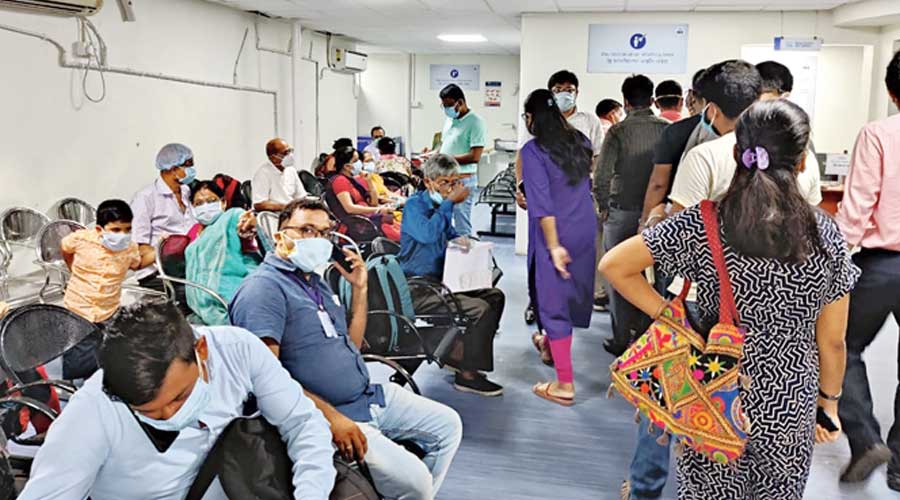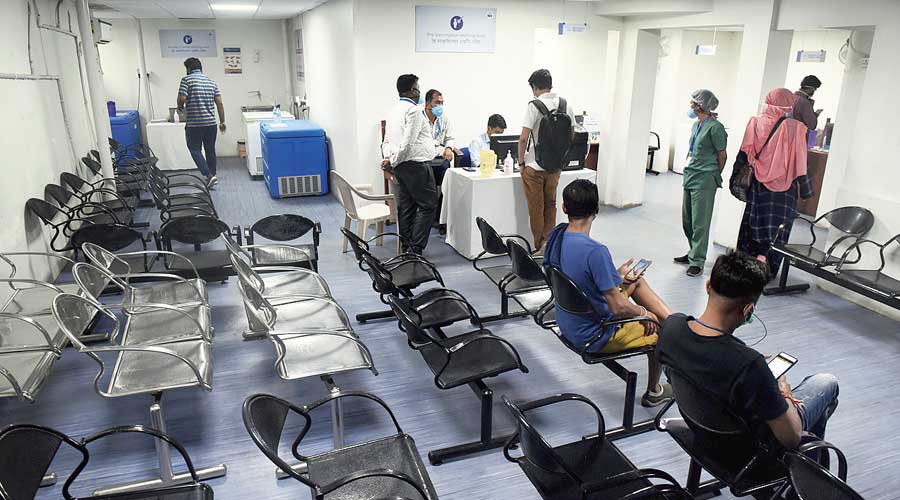Private vaccination centres in Kolkata are having very few recipients over the past month, a trend that officials at the centres and the state government attribute to several factors.
Some of the reasons, the officials said, are aggressive vaccination programmes in urban areas, jab prices at private centres and supply problems in May.
The Telegraph tries to find out why vaccination centres at private hospitals across Kolkata are remaining near-empty.
Price factor
The CEO of a private hospital said vaccination at his centre had reduced to a third compared with a few months ago and the main reason for the fall was the price of the jabs.
When Covid vaccination was opened to the general public earlier this year, private centres were charging Rs 250 a dose. Since May, they have been charging Rs 780 for Covishield and Rs 1,410 for Covaxin.
The prices of vaccines went up after the Centre decided that private centres would have to procure the doses directly from the manufacturers.
“When the price was capped at Rs 250, families would come in big groups and also send their drivers and help to get vaccinated at private centres. However, since the steep hike in vaccine prices, many people have been preferring government facilities where the vaccination is free,” said Pradip Tondon, the CEO of Belle Vue Clinic. Belle Vue at one point of time was vaccinating 800 people every day. The number has since come down to around 100.
Even some of the hospitals that are providing Covishield at the cost price of Rs 630 are also not having a rush anymore.
The RN Tagore International Institute of Cardiac Sciences charges Rs 630 for each dose of Covishield but has only a handful of takers.
“We are charging Rs 630, which is the cost price of the vaccine (for private hospitals). Despite that, the footfall has gradually decreased from 1,200 to... 400 and 500,” said R. Venkatesh, regional director, east, Narayana Health, of which the RN Tagore Hospital is a flagship unit.
“We have observed that many people who had taken the first dose at our hospital, when we were charging Rs 250, did not come back for the second dose. The price had by then jumped,” he said.
The Telegraph has reported that many real estate and manufacturing units were getting their workers vaccinated at private hospitals at their cost because of the desperation to start production following the relaxation of curbs that were announced during the peak of the second wave of Covid-19.

A queue for Covid vaccines at the RN Tagore International Institute of Cardiac Sciences about a month ago. Picture by Sanat Kr Sinha
The state government had made it mandatory for these units to ensure workers have at least one dose of the vaccine before they were allowed to join work.
Supply issues
After April 30, the private healthcare institutes were asked by the Centre to procure vaccines directly from the manufacturers.
However, most private centres were finding it difficult to procure the doses.
“We had been sending mails almost every day for about a month to the manufacturers of Covishield and Covaxin but would hardly get a reply. Later, we deposited money. But the amount was refunded and we didn’t get any supply,” said Sudipta Mitra, the chief executive of Peerless Hospital.
The hospital had in May refused vaccines to hundreds of people. “The supply finally became normal in the middle of June,” said Mitra.
The state government had tried to help the private hospitals procure vaccines but in vain. It was alleged that the manufacturers were prioritising supply to government facilities.
“We faced a severe crisis in May, when there was no supply of vaccines for about 20 days. That time the demand was very high as the second wave was at its peak and people were desperate to take the shot,” said Rupak Barua, the president of the Association of Hospitals of Eastern India and the group CEO of AMRI Hospitals.
The problem started smoothening out at the end of May, he said.
According to the hospitals, because of the break in the vaccination drive, the momentum peaked up only in June.
The government has set the gap between the two doses of Covishield, which most private hospitals were administering, at 12 to 16 weeks.
So, most hospitals will have a rush for the second dose from September, the CEOs of several hospitals said.
Urban focus
An aggressive vaccination drive in urban areas, by both government and private facilities, has led to many people already taking at least one shot.
“We have focused on urban areas to cover the maximum population possible to prevent further spread of Covid. This has produced results,” said Narayan Swaroop Nigam, Bengal’s health secretary. According to the state health department, till August 24, 77.68 per cent of the people living in areas under urban local bodies have received at least one dose and 35.3 per cent have got both doses.
Many private hospitals had taken up off-site vaccination programmes and that helped, too, said officials of the health department.
Hospitals set up vaccination camps at many residential complexes and offices.
“Now, the demand for off-site vaccination has gone down significantly. Many of the recipients are waiting for the second dose, while others are going to government facilities,” said Tondon, of Belle Vue Clinic. The hospital had in July vaccinated around 3,000 people daily at off-site camps. In August the number came down to zero.
The RN Tagore hospital had vaccinated around 1,500 people daily at off-site camps. It has also stopped the camps this month because of a fall in demand.
The AMRI Hospitals group was at one point vaccinating 4,000 people daily at outreach centres. “Now, we have only two centres — at Acropolis and South City Mall. The number is barely 250 every day,” said Barua of AMRI.

